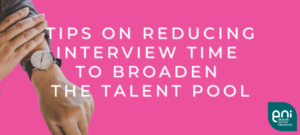8 Tips on Reducing Interview Time to Broaden the Talent Pool!
Looking to broaden the talent pool? Let’s start with the length of an interview!
ENI have been speaking to candidates to get their take on long interview’s – we’re talking in one sitting, not multiple. Some cases these might be over 2 hours.
There are many reasons an interview might need more time blocked out, for example:
- There could be a task to present, or even complete during the interview.
- There could be a few essential people in the business to meet.
- This might include meeting the team you’ll be working/be managing.
Whilst we totally understand this can be a little inconvenient, we also must consider the fact that this might not work for everyone, and there are a number of reasons as to why.
- Working hours look different for everyone, as do family set ups!
- Neurodivergent people may struggle a little with focusing and absorbing so much information in one sitting.
- Some may need additional accommodations, not only to be there in person, but for longer periods.
❌ 58% of candidates asked (400+) said they would not commit to a 2-hour interview on working days.
✅ 42% said they would if it were the right role.
Not a bad split you might think, but that’s half the talent pool gone!
Shortening interview processes without sacrificing key information can be challenging, but with careful planning and execution, it’s possible to streamline the process while still gathering the detail needed. Here are some tips:
1. Set clear objectives. What key information is it that you need to gather from the interview at each stage? For example, at first stage, this may be identifying essential skills and experience required for the role. At second stage, you may be looking to see evidence of this.
2. Make sure the advert is clear and concise. This prevents lengthier discussions than necessary if all parties have the right information.
3. Measure how effective your screening process is and adjust accordingly. Is this by phone, video or face-2-face? How long is this? How targeted are the questions you’re asking? Make this all about the role and how their experience aligns and try to keep at 30mins or less.
4. Prep your questions! Make sure these cover essential areas – this ensures that you gather consistent information from everyone you interview, focusing on relevant topics and preventing tangents.
5. Clarify and optimise the interview process. Sometimes using a panel approach can be beneficial as it allows for a more comprehensive assessment and reduces the need for more meetings.
6. Optimise tasks where necessary. If you are going to ask candidates to present or complete a task, send this before-hand instead of during one long interview. Not only does this help to reduce the time of one interview, but it’s also inclusive practice for Neurodivergent people who might feel overwhelmed or struggle to focussing.
7. Set time limits on interviews and stick to it. This will help keep conversations focused, just be mindful not to rush and cut conversations off prematurely. Your prep and planning will come in handy here.
8. Make decision making as efficient as possible. Establish clear evaluation criteria and provide feedback quickly, and individually if using a panel format. Deliberation periods can increase bias so we would recommend doing this right after the interview, and alone.
Whilst shortening the interview process is beneficial, it’s important not to compromise the quality of the information gathered.
Taking these steps can help broaden the talent pool as you’re less likely to exclude large groups.
If you’d like to speak with us about fine-tuning processes and making these more inclusive, we’d love to chat. Get in touch with us, or reach out to our Marketing Manager Letitia Oglesby – letitia@elizabethnorman.com

